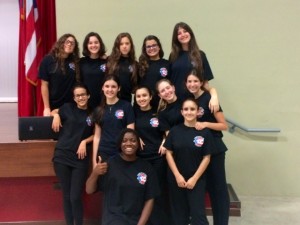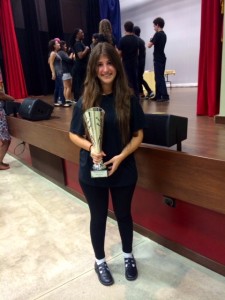Article submitted by Carmen Ana Nieto*, email: nananieto11@gmail.com
*Carmen Ana Nieto is the president of the Model United Nations Club, and the Vice-President of the English Forensics Club at Colegio Puertorriqueño de Niñas, in Guaynabo, Puerto Rico.
Model United Nations (MUN) helps high school students acquire and develop many useful skills for any future career. It exposes participants to current events and prompts their interest in global, political and economic issues. There are, however, other extracurricular activities that may seem at first unrelated to MUN, but that provide excellent opportunities and training to become better MUN delegates. I am talking specifically about speech clubs.
I began my involvement with MUN when I was thirteen. At that young age, I was a relatively shy delegate. At conferences, I would participate in debates, but my face would be constantly hidden behind a notepad. I had to write down every single word that I wanted to say, so I could later recite them in front of the committee. Writing everything you want to say is not only time consuming, but also prevents you from paying attention to the current debate.
Although the committee’s topic, my country’s policy, points of debate and proposed solutions were all in my head, I was completely dependent of my notepad. Not to be misunderstood, using a notepad is never a bad thing. It is very useful to outline your ideas in writing before giving a speech. It forces you to organize your thoughts clearly and visually.
Nevertheless, in terms of perception, projection, and reception by an audience, reading everything from a notepad projects lack of confidence. If you really want to take control of your solutions and ideas for a committee, it is better to minimize the amount of reading.
At first, most MUN competitors focus mainly on what they say, and not on how they say it. Eventually, you realize that the way in which you present your arguments increases the attractiveness of your delegation’s position, and helps you gain support from your peers in the committee.
It was clear to me that I had to develop public speaking skills outside of MUN. I began to explore my options and came across the forensics club at my school. Forensics is a speech club that prepares participants for one large-scale regional competition at the end of the school year. Participants from various schools deliver speeches in four different categories: oratory, humorous, serious drama, and original. Each student must select a speech that has been previously performed in front of a live audience, or, in the original category, write the speech. All speeches must be staged and practiced prior to the annual competition.
My older sister had always been involved in the forensics club. She has a passion for the arts, specifically acting, and I ignorantly classified forensics as an acting and theater club. I did not think that the club could help me in any way. Yet, after participating in the 2012 Forensic League competitions, my opinions changed.
I used to think that the speeches were only evaluated on their length, and the student’s ability to memorize it completely. This was a false assumption, and I realize now that there is more to delivering a speech than just memorizing the content.
I decided to join the English Forensics club in my sophomore year in the oratory category, delivering the speech “An Anarchist Looks at Life” by Emma Goldman. It was a political and philosophical speech, something I could relate to MUN. It was a wonderful experience that proved that I could memorize a speech, and later convey it with grace and fluent oratory. I enjoyed my forensics experience so much that I ran for office in that club and eventually became president during my junior year. I also joined my school’s oratory club, a speech club where the speeches are delivered in Spanish.
In forensics, I remained in oratory, and in the Spanish speech club, I participated in the improvisation category. Improvisation is very challenging. Each student is given a random topic and about five minutes to plan a speech. Then, he or she has to perform it immediately thereafter. The topics can range from controversial issues, like the death penalty or abortion, to current events, or specific situations, like the death of a loved one or winning the lottery. To prepare for this category, a student must train the mind. You practice how to develop an introduction, a body, and a conclusion in a coherent and complete structure, all while improvising the words on the spot.
I had the privilege of receiving a fifth place in my first improvisation experience in March 2014. This experience has helped me to develop the ability to respond to any situation using my verbal skills and body language. As for MUN, it has improved my ability to respond to crisis simulations quickly and effectively.
Later in late April 2014, I participated in the English Forensic competition. I did a speech entitled “What I Learned from My Autistic Brothers”. This speech, written and delivered by Faith Jegede, focuses on her two autistic brothers, Remi and Sam. I wanted to change the tone and the vibe of most oratory speeches, which tend to be serious and political. This speech was more personal and heartwarming, and it could be used to expand my speech skills in terms of emotion and eye contact. I had to practice the staging of hand gestures and facial expressions, something that seems easy, but that in fact is hard to do while appearing comfortable. All the hard work paid off and I was fortunate enough to win first place in the oratory category of this year’s Forensic League competition.
I had been developing my public speaking skills throughout the entire school year. As a result, I feel that my MUN skills have also improved. I feel more confident and more willing to debate at conferences because I can convey my thoughts effectively.
I strongly recommend to all my fellow MUN delegates to get involved in speech and debate clubs in any language. This training can help to turn good delegates into great ones.



